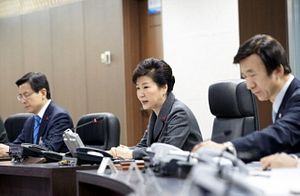In response to the North Korean nuclear test on Wednesday, South Korea will resume anti-North propaganda broadcasts along the demilitarized zone that separates the two.
Cho Tae-yong, the deputy chief of national security at the Blue House (South Korea’s presidential office), said the broadcasts would begin at noon on Friday – Kim Jung-un’s birthday – according to Yonhap.
In August 2015, South Korea resumed the propaganda broadcasts for the first time since 2004. The decision came after an incident in which two South Korean soldiers were injured by landmines. South Korea’s loudspeakers blared not only anti-North Korean rhetoric, but weather reports, global news, and K-pop music. North Korea responded by launching artillery shells at the loudspeakers and announcing a “quasi-state of war.”
As David Eunpyoung Jee noted for The Diplomat last summer, the North’s furious reaction to the broadcasts indicated just how seriously Pyongyang takes the propaganda broadcasts – and how powerful a tool they could be for Seoul. The two sides negotiated their way back from the brink in late August, with South Korea agreeing to halt the broadcasts in exchange for an apology for the landmine incident and a promise not to undertake future provocations.
In explaining South Korea’s decision to resume the broadcasts, Cho told reporters that North Korea’s nuclear test was a “grave violation” of the August 25 deal. He said that South Korean troops would be ready to retaliate in the case of further North Korean provocations in response to the broadcasts.
Last August, North Korea threatened military action if the broadcasts were not stopped. The response could be even greater this time around, as the broadcasts will pointedly resume on the North Korean leader’s birthday. In a statement on Wednesday, Pyongyang justified its nuclear test as “a measure for self-defense the DPRK has taken to firmly protect the sovereignty of the country and the vital right of the nation from the ever-growing nuclear threat and blackmail by the U.S.-led hostile forces.”
“The DPRK’s access to H-bomb of justice… is the legitimate right of a sovereign state for self-defense and a very just step no one can slander,” the government statement continued. Pyongyang also promised that North Korea “will steadily escalate its nuclear deterrence of justice both in quality and quantity.”
In a National Security Council meeting on January 6, South Korea President Park Geun-hye promised that Seoul “will work in close cooperation with the international community to ensure that North Korea will pay the price for conducting a new nuclear weapons test.” She called the test “not only a grave provocation to our security, but is also a threat to our existence and future,” particularly if the test is found to have involved a hydrogen bomb, as North Korea claims.
Park has held conversations with both U.S. President Barack Obama and Japanese Prime Minister Shinzo Abe regarding possible responses to the nuclear test. The United States and South Korea agreed to cooperate closely “to make sure that the North pays a price corresponding to the seriousness of the test this time,” according to the Blue House. Meanwhile, Park and Abe also agreed to cooperate on strong sanctions on North Korea, cooperation made easier by the recent breakthrough on the “comfort women” issue.

































